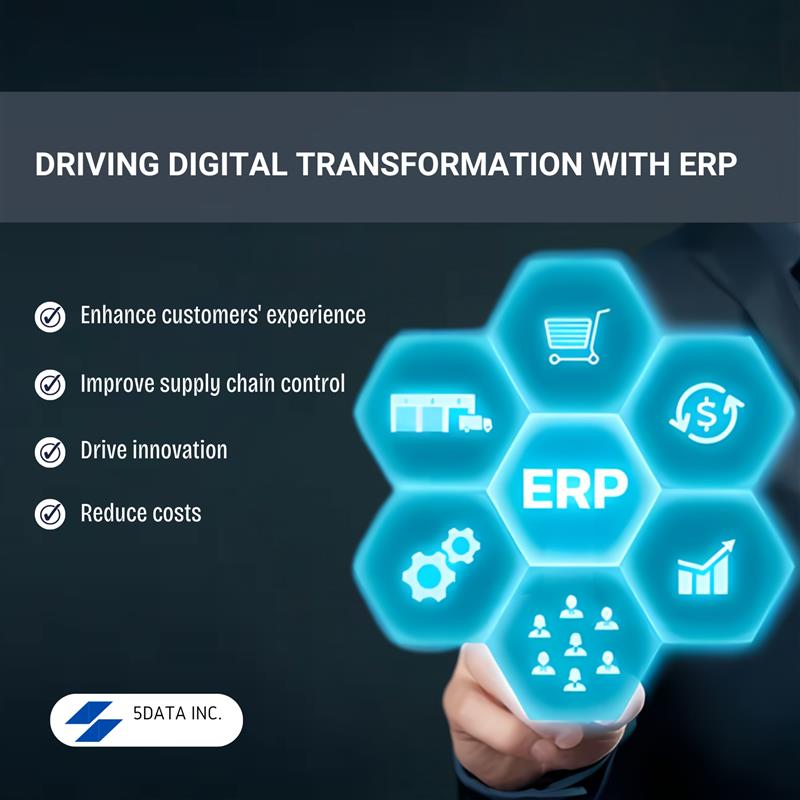Enterprise Resource Planning (ERP) systems have long served as the cornerstone of business activities for decades, providing a unified platform for overseeing multiple facets of an organization. As technology advances, ERP are experiencing a major transformation. SAP, one of the leading providers of ERP solutions, has been at the forefront of these innovations. This article delves into SAP’s recent advancements and explores the future of ERP, focusing on how it can help organizations streamline processes, improve decisions, and drive growth.
Enterprise Management Systems have undergone significant transformations over the decades. Initially designed to integrate and automate core business processes, modern ERP methods now encompass a broader range of capabilities, including data migration, intelligent automation, and cloud technology.
Choose from the Best ERP service Providers to optimize your business processes and drive efficiency. SAP’s ERP solutions exemplify this evolution, providing organizations with tools to enhance productivity, optimize problem-solving, and achieve seamless integration across various business functionality.
Key Takeaways
- SAP is leading the future of ERP with innovations in cloud, AI, and automation to propel businesses through digital transformation.
- Key advancements like SAP S/4HANA Cloud and intelligent automation are streamlining business operations and decision-making processes.
- SAP’s roadmap focuses on enhancing user experiences, industry-specific solutions, and seamless ecosystem integration.
SAP’s Innovations and Roadmap
SAP Solutions has consistently introduced groundbreaking recent innovations to its ERP solutions, aiming to meet the evolving needs of businesses. Some key areas of focus include: Intelligent Mechanization- Robotic Process Automatic Control (RPA): Automating repetitive, rule-based tasks to improve efficiency and reduce errors.
- Intelligent Process Automation (IPA): Combining RPA with AI capabilities to enable more complex decision processes and problem-solving.
- Machine Learning: Utilizing algorithms to examine data and recognize patterns for improving processes and forecasting future trends.
- SAP S/4HANA Cloud: A cloud-based ERP operation that offers scalability, flexibility, and reduced IT costs.
- Hybrid Cloud: Combining on-premises and cloud-based components to meet specific business requirements.
- Data Migration: Seamlessly transferring data from legacy systems to the virtual environment.
- Process Optimization: Identifying and eliminating inefficiencies in business processes to improve performance.
- Digital Transformation: Embracing digital technologies to enhance the feedback of customers, improve operations, and drive innovation.
- Industry-Specific Solutions: ERP solutions are tailored for various industries, such as manufacturing, retail, and healthcare.
- API Integration: Connecting enterprise management systems with other applications and platforms to facilitate data exchange and streamline workflows.
- Ecosystem Integration: Collaborating with partners and third-party vendors to offer comprehensive solutions.
- Continuous Innovation: Regularly updating ERP solutions to incorporate the latest technologies and best practices.
- User Experience: Providing intuitive interfaces and personalized experiences to enhance user adoption.
Plan And Track ERP Transformation
Implementation of ERP transformation can be a complex undertaking. Here are some key steps to consider:- Define Objectives: Clearly articulate the desired outcomes of the transformation, including improved efficiency, cost savings, and enhanced strategy.
- Assess Current State: Evaluate the organization’s existing ERP system, identify pain points, and assess its alignment with business goals.
- Select the Right Solution: Choose an ERP solution that meets the organization’s specific needs and aligns with its future growth plans.
- Develop a Project Plan: Create a detailed project plan outlining timelines, resources, and responsibilities.
- Implementation in Change Administration: Address employee concerns and resistance to change to ensure successful adoption.
- Monitor and Measure Progress: Track key performance indicators (KPIs) to measure the transformation’s impact and identify areas for improvement.

Driving Digital Transformation With ERP
Enterprise management systems go beyond merely handling back-office functions; they are essential components of a broader digital transformation strategy. By integrating with other technologies and platforms, enterprise management systems can enable businesses to:- Enhance customers’ experience: Provide personalized experiences, improve customer services, and optimize sales processes.
- Improve supply chain control: Streamline procurement, inventory control, and logistics.
- Drive innovation: Foster a culture of innovation and experimentation through data-driven insights and agile processes.
- Reduce costs: Optimize operations, eliminate waste, and improve efficiency.
AI and Machine Learning’s Impact on ERP
Artificial intelligence (AI) and machine learning (ML) are revolutionizing Corporate Resource Planning Systems by enabling more intelligent and robotic processes. Some key applications include:- Predictive analytics: Forecasting future trends and outcomes based on historical data.
- Natural language processing: Enabling natural language interactions with the ERP system.
- Cognitive mechanization: Automating complex tasks that require judgment and strategy planning.
- Intelligent chatbots: Providing automated customer support and answering queries.
Future Of ERP
Several trends are shaping the future of the Corporate Resource Planning System:- Cloud-first approach: The continued adoption of cloud-based ERP solutions due to their scalability, flexibility, and cost-effectiveness.
- Increased focus on data: Leveraging data analytics and AI to drive decision processes and improve business outcomes.
- Integration with emerging technologies: Incorporating technologies such as IoT, blockchain, and augmented reality into Enterprise Application Suites.
- Industry-specific solutions: The development of tailored ERP solutions for specific industries to address their unique needs.
- Enhanced user experience: Providing intuitive interfaces and personalized experiences to improve user adoption.
Conclusion
The future of ERP is being shaped by rapid technological progress, with SAP at the forefront, offering innovative solutions that drive business transformation. By embracing SAP’s innovations and aligning with its roadmap, the corporation can optimize its business process, improve strategy, and achieve greater operational efficiency. As you plan and track your ERP transformation, remember to involve key stakeholders, invest in training, and continuously monitor progress to ensure a successful implementation.Frequently Asked Questions (FAQS)
What is the role of cloud computing in SAP’s ERP solutions?
Cloud computing in SAP’s ERP solutions offers scalability, flexibility, and cost-effectiveness, enabling businesses to keep their systems current and integrate seamlessly with other platforms.How does cognitive mechanization improve business operations in SAP’s ERP solutions?
Cognitive mechanization enhances business operations in SAP’s ERP solutions by streamlining repetitive tasks and increasing efficiency through advanced technologies.What are the benefits of Artificial intelligence in SAP’s ERP solutions?
Artificial Intelligence in SAP’s ERP systems provides valuable insights and predictive analytics that optimize decision-making and enhance operational efficiency.How can organizations align their ERP transformation with SAP’s roadmap?
Businesses can align their ERP transformation with SAP’s roadmap by integrating the upcoming innovations and strategy directions outlined in the roadmap into their transformation plans.
Rasmita Patro
Author
